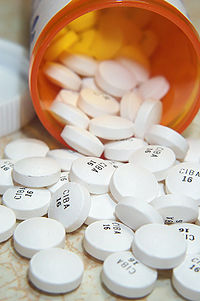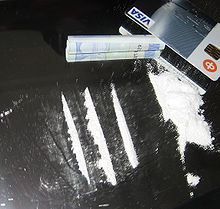兴奋剂

20mg長效型的哌甲酯錠

可卡因常拿來做為娛樂性藥物
興奮劑又稱為中樞神經興奮劑、中樞神經刺激劑(英文名稱:stimulant、psycho-stimulant)是一系列精神藥物的統稱,其中包括可以增加活動力的藥物[1]、會令人感到愉快和振奮的藥物,以及有交感兴奋作用的藥物[2]。兴奋剂可以提升警覺心、注意力和活力,同時也增加血壓、心跳和呼吸[3],常用作處方藥(例如ADHD的兒童或成人[3]、嗜睡症),但也有用於藥物治療以外的使用(可能是脱法药物或是非法使用),可能做為表現增強物質或是娛樂性藥物。
一些藥物能影響自我管理能力。例如:歸類為中樞神經興奮劑的藥物:哌甲酯(methylphenidate)和安非他命(amphetamine)。適度適量使用,能提升一個人整體的衝動控制能力(inhibitory control),且被用來治療注意力不足過動症(ADHD)患者。[4][5]
同理,中樞神經抑制劑(depressants)(例如:酒精)由於會讓腦中神經傳導物質濃度降低、減少許多大腦區域的活性等,所以可能會造成專注力、神智清醒度等自我管理能力的下降。[6]
在美國,2013年最常用的處方藥兴奋剂有lisdexamfetamine、哌甲酯及安非他命[7]。
目录
1 醫療用途
1.1 注意力不足過動症
2 安全性
3 副作用
4 備註
5 參考資料
6 相關條目
醫療用途
中樞神經刺激劑在醫學上用來治療肥胖、睡眠疾患、嗜睡症(narcolepsy)、情感性疾患、注意力不足過動症、頑固型憂鬱症、頑固型強迫症、氣喘、和鼻塞等。
[3][8]
注意力不足過動症
用來治療ADHD的興奮劑包含:
- 哌甲酯
- 苯丙胺
- Dextroamphetamine
- Lisdexamfetamine Dimesylate
[3]
安全性
只要按照指示使用,中樞神經刺激劑如同其他藥品一樣安全,不會導致藥物濫用或成癮。研究顯示,以中樞神經興奮劑治療注意力不足過動症的患者,其往後將比沒有以中樞神經興奮劑治療的注意力不足過動症患者享有明顯更低的藥物濫用風險。[3]
副作用
如同其他藥物,中樞神經刺激劑也有副作用產生的可能,然而不是每個服用興奮劑的人都會有副作用。中樞神經刺激劑的副作用大都輕微(minor)並且在劑量降低或與其他藥物併用、調整服藥時間等調適後消失。
較常見的副作用[註 1]包含:
- 難以入睡或難以維持睡眠。
- 胃口降低。
- 胃部不適。
- 頭疼。
較少見的副作用[註 2]包含:
- 肢體抽動或聲音抽動。(突然的、重複的動作或聲音)
[3]
備註
^ 「常見副作用」的定義為:在臨床試驗中,實驗組中至少5
%的人出現此症狀,且在實驗組中出現此反應的比例為安慰組的兩倍。
^ 「較少見的副作用」的定義為:在臨床試驗中,實驗組中至少2
%的人出現此症狀,且在實驗組中出現此反應的比例多於安慰組。
參考資料
^ stimulant - definition of stimulant in English | Oxford Dictionaries. Oxford Dictionaries | English.
^ Treatment, Center for Substance Abuse. Chapter 2—How Stimulants Affect the Brain and Behavior. Substance Abuse and Mental Health Services Administration (US) (英语).
^ 3.03.13.23.33.43.5
Mental Health Medications.. National Institute of mental health. (tertiary source). October 2016 [April 15th, 2017.]. 请检查|access-date=中的日期值 (帮助)
^ Spencer RC, Devilbiss DM, Berridge CW. The Cognition-Enhancing Effects of Psychostimulants Involve Direct Action in the Prefrontal Cortex. Biol. Psychiatry. June 2015, 77 (11): 940–950. PMID 25499957. doi:10.1016/j.biopsych.2014.09.013.The procognitive actions of psychostimulants are only associated with low doses. Surprisingly, despite nearly 80 years of clinical use, the neurobiology of the procognitive actions of psychostimulants has only recently been systematically investigated. Findings from this research unambiguously demonstrate that the cognition-enhancing effects of psychostimulants involve the preferential elevation of catecholamines in the PFC and the subsequent activation of norepinephrine α2 and dopamine D1 receptors. ... This differential modulation of PFC-dependent processes across dose appears to be associated with the differential involvement of noradrenergic α2 versus α1 receptors. Collectively, this evidence indicates that at low, clinically relevant doses, psychostimulants are devoid of the behavioral and neurochemical actions that define this class of drugs and instead act largely as cognitive enhancers (improving PFC-dependent function). This information has potentially important clinical implications as well as relevance for public health policy regarding the widespread clinical use of psychostimulants and for the development of novel pharmacologic treatments for attention-deficit/hyperactivity disorder and other conditions associated with PFC dysregulation. ... In particular, in both animals and humans, lower doses maximally improve performance in tests of working memory and response inhibition, whereas maximal suppression of overt behavior and facilitation of attentional processes occurs at higher doses.
^ Ilieva IP, Hook CJ, Farah MJ. Prescription Stimulants' Effects on Healthy Inhibitory Control, Working Memory, and Episodic Memory: A Meta-analysis. J. Cogn. Neurosci. January 2015: 1–21. PMID 25591060. doi:10.1162/jocn_a_00776.Specifically, in a set of experiments limited to high-quality designs, we found significant enhancement of several cognitive abilities. ... The results of this meta-analysis ... do confirm the reality of cognitive enhancing effects for normal healthy adults in general, while also indicating that these effects are modest in size.
^
Long-term & Short-term effects, depressants, brand names: Foundation for a drug free work.
^ Top 100 Drugs for Q4 2013 by Sales - U.S. Pharmaceutical Statistics. www.drugs.com.
^
Harper, S. J.; Jones, N. S. Cocaine: what role does it have in current ENT practice? A review of the current literature. The Journal of Laryngology and Otology. 1 October 2006, 120 (10): 808–811. ISSN 1748-5460. PMID 16848922. doi:10.1017/S0022215106001459.
相關條目
- 抗精神病药
- Depressant
- 致幻剂
- 益智药
| ||||||||||||||||||||||||||||||||||||||||||||||||||||||||||
| ||||||||||||||||||||||||||||||||||||||||||||||||||||||||||||||||||||||||||||||||||||||||||||||||||||||||||||||||||||||||||||||||||||||||||||||
| ||||||||||||||||||||||||||||||||||||||||||||||
| ||||||||||||||||||||||||||||||||||||||||||||||||||||||||||||||||||||||||||||||||||||||||||||||||||||||||
|